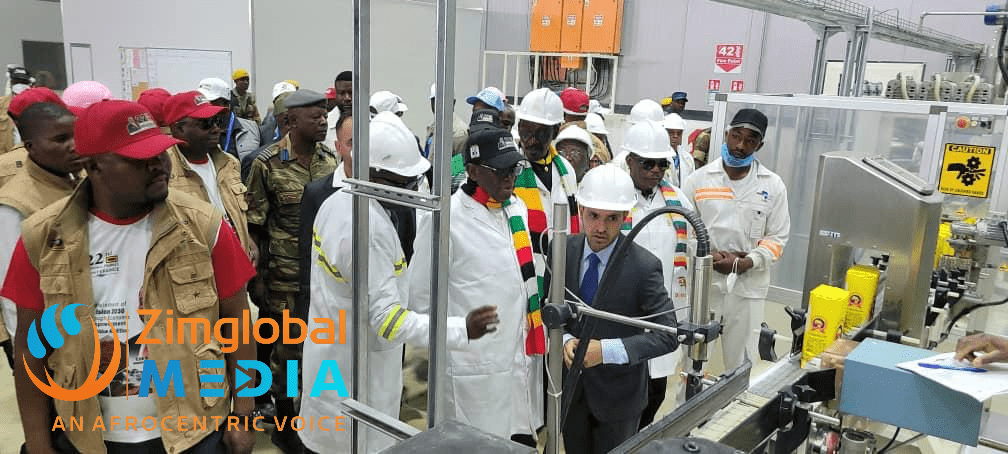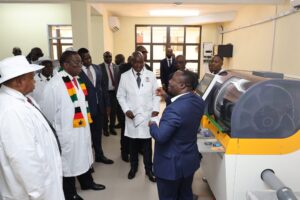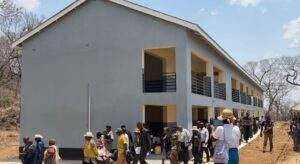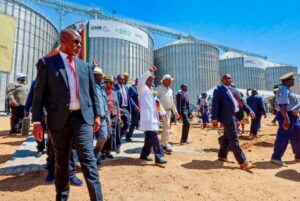President Mnangagwa Commissions NatPharm Warehouse, Mega Market Flour Milling Plant in Mutare
5 min read
In a development that underscores Zimbabwe’s commitment to modernising critical national infrastructure, President Emmerson Dambudzo Mnangagwa earlier today officially opened the Mutare NatPharm Pharmaceutical Warehouse at Victoria Chitepo Provincial Hospital.
The President also commissioned the Mega Market Flour Milling Plant in Mutare, marking what he described as “a powerful statement of national progress, resilience, and economic transformation through practical action.”
The twin events, which drew thousands of residents, government officials, health professionals and business stakeholders, reflect the Second Republic’s ongoing pursuit of a modernised health system, improved drug distribution efficiency, and a revitalised industrial base anchored on value addition and food self-sufficiency.
The President was accompanied by Vice Presidents Hon. General (Rtd) Dr. Constantino Chiwenga and Hon. Col. (Rtd) Kembo Mohadi, together with ZANU PF National Chairperson and Minister of Defence, Hon. Oppah Muchinguri-Kashiri, senior government ministers, provincial leaders and officials from the business sector.
The newly commissioned NatPharm Mutare Warehouse is part of a broader initiative to completely overhaul Zimbabwe’s medical supply chain by decentralising pharmaceutical storage and distribution.
For many years, healthcare facilities in the eastern region—particularly in rural districts such as Nyanga, Chipinge, Buhera, and Chimanimani—have endured long delays in receiving life-saving medicines and medical sundries due to reliance on distant depots.
With the launch of this modern warehouse, the government has taken a decisive step toward resolving stock distribution inefficiencies while strengthening emergency medical response systems.
“This warehouse is not just about bricks and mortar—it represents our government’s unwavering commitment to ensuring that no Zimbabwean is left behind in accessing essential medicines,” President Mnangagwa said in his keynote address.
“This investment will enhance inventory control, shorten delivery times, and ensure consistency in drug availability especially in rural clinics and district hospitals.” The President added.
Built to meet World Health Organisation (WHO) standards, the warehouse is equipped with state-of-the-art temperature control systems, digital inventory management technology, and expanded storage capacity for pharmaceuticals, medical equipment and vaccines.
It will serve as a hub for Manicaland Province and surrounding regions, integrating seamlessly with NatPharm’s national distribution network that links primary healthcare facilities to provincial hospitals.
Vice President Chiwenga, said the commissioning represented “a monumental leap in Zimbabwe’s healthcare reform journey.”
“Under the Second Republic, we are building hospitals, equipping clinics and modernising health infrastructure—not as slogans but as tangible realities,” said VP Chiwenga.
“This facility supports our mission to guarantee affordable and accessible healthcare to all citizens in line with Vision 2030.” The Vice President added.
He further added that the government was also strengthening local pharmaceutical manufacturing through partnerships with local companies to reduce drug importation costs and promote national self-sufficiency.
Soon after the NatPharm commissioning, President Mnangagwa turned his attention to Zimbabwe’s industrial and food security goals with the official launch of the Mega Market Flour Milling Plant.
Located in Mutare’s industrial area, the new milling plant has a production capacity that significantly increases the province’s processing capability for wheat, maize and grain-based products.
The plant is expected to supply flour to both local and regional markets, reducing reliance on imports while stabilising local supply chains for bakeries and food manufacturers.
“This investment is a direct response to our national call for industrialisation and value addition,” said President Mnangagwa during the commissioning ceremony. “We are moving away from being mere producers of raw commodities to becoming processors and exporters of finished goods. Zimbabwe grows wheat—Zimbabwe must process wheat, package wheat, and export wheat-based products.”
The President applauded the Mega Market Group for complementing government efforts under the National Development Strategy 1 (NDS1), which emphasises economic transformation, job creation, increased productivity and rural industrialisation.
“Private sector players like Mega Market are true partners in our national journey. Their investment speaks to confidence in our economic recovery plan,” he said.
The milling plant is expected to create hundreds of direct and indirect jobs within Manicaland Province, particularly benefiting transporters, farmers, packaging suppliers and retail chains.
Local wheat farmers will also benefit as the plant sources raw grain locally, cutting post-harvest losses and providing a guaranteed market.
Manicaland Province continues to experience strategic development under the Second Republic following road infrastructure upgrades, dam construction, farming programmes, and now expanded healthcare and food processing capacity.
Provincial Affairs and Devolution Minister Hon. Misheck Mugadza said the province was emerging as “a development corridor linking agriculture, industry, and public service modernization.”
“The commissioning of these two major projects on the same day shows how seriously the Second Republic views the development of Manicaland. We are witnessing real transformation—not empty promises,” he said.
He further reiterated that the newly commissioned NatPharm warehouse would strengthen disaster response mechanisms in a province frequently affected by natural disasters such as Cyclone Idai.
Addressing attendees, ZANU PF National Chairperson and Defence Minister Hon. Oppah Muchinguri-Kashiri, who hails from Manicaland, said the province was a proud beneficiary of President Mnangagwa’s leadership.
“The people of Manicaland are eternally grateful to His Excellency for prioritising development. These projects are a reflection of servant leadership—a leadership that listens, responds, and delivers,” she said. “This warehouse will save lives. This milling plant will feed families and empower our local economy. This is the Zimbabwe we are building together.”
Residents of Mutare who witnessed the double commissioning expressed joy and optimism, saying the developments would change lives on the ground.
“Many of us in rural areas travel up to 40km to get basic medicine like antibiotics or insulin. This warehouse is going to make a big difference,” said Miriam Chisango from Wengezi.
For local entrepreneur Tawanda Nyabadza, the Mega Market plant represents hope for small businesses. “As SMEs, we rely on consistent flour supplies. This plant brings stability and opens opportunities for bakeries and confectionery businesses across Manicaland.”
The opening of the Mutare NatPharm Pharmaceutical Warehouse and the commissioning of the Mega Market Flour Milling Plant are more than ceremonial events—they demonstrate a government that continues to focus on tangible development.
From health sector reform to food security and industrial expansion, today’s twin milestones signal momentum toward President Mnangagwa’s Vision 2030—transforming Zimbabwe into an upper-middle-income nation.
The presence of the President, Vice Presidents Chiwenga and Mohadi, and senior government officials at the events highlights the political will behind delivering infrastructure that improves livelihoods.
As Zimbabwe continues on its recovery and growth path under the mantra “Nyika inovakwa, inotongwa, nevene vayo — Ilizwe lakhiwa, libuswe ngabanikazi balo — A country is built and ruled by its own people”, Mutare today stood as a proud example of development in motion.




